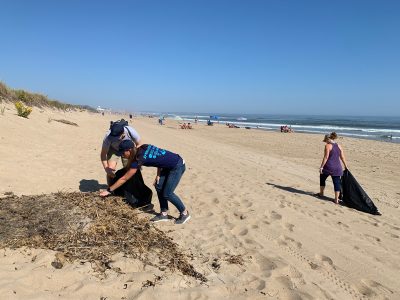
The Massachusetts Office of Coastal Zone Management kicked off its annual COASTSWEEP beach cleanup program Saturday, which was also International Coastal Cleanup Day.
The kick off event, which was hosted at the Salisbury Beach State Reservation, marked the official beginning of 2019’s coastal cleanup season in Massachusetts. This year, 100 beach cleanups have already been scheduled at various beaches across the state’s coastline, taking place from the beginning of September to early November, according to CZM’s website.
In Boston, two events are scheduled to take place this coming weekend—with one on Saturday at the University of Massachusetts Boston and a second on Sunday at Castle Island, according to a list of events published by CZM.
Founded in 1987, COASTSWEEP is Massachusetts’ contribution to the International Coastal Cleanup campaign championed by Ocean Conservancy, a Washington, D.C.-based nonprofit advocating for marine habitat conservation and cleaner oceans.
This year’s kick off comes after the massive international Climate Strike on Sept. 20, which saw millions of people in cities across the globe rallying to protect the environment and protesting inaction on the issue of climate change.
Since the program was founded 33 years ago, thousands of volunteers have removed hundreds of tons of trash and other debris from the state’s beaches, lakes, rivers and seafloor, according to a state press release.
Robin Lacey, COASTSWEEP’s local cleanup logistics coordinator, said COASTSWEEP volunteers help to protect Massachusetts’ coastal habitats by ridding local beaches of trash, preventing this debris from being ingested by marine life.
Lacey said while he knew that this annual program would not “make a dent in all the litter and trash that’s out there,” COASTWEEP uses their cleanups as an opportunity to educate their volunteers on the consequences of littering.
“When you really dig down hard, there’s a lot of trash out there, especially some of the smaller items like cigarette butts and micro plastics,” Lacey said, “which tend to be plastic that has been discarded into the environment and through weathering and UV rays.”
Lacey said COASTSWEEP volunteers record every item they pick up. These numbers are then submitted to Ocean Conservancy, which compiles data from coastal clean-up programs across the U.S. into one massive database for environmental research.
Of all the trash they retrieve, Lacey said cigarette butts are by far the most common item recovered from the beach.
“People smoke on the streets,” Lacey said, “so when it rains the storm water washes the debris off the streets and that water winds up in our oceans and it all floats ashore.”
Lacey said COASTSWEEP volunteers come from all across the state, with schools, Boy Scouts, students and other concerned residents all giving their time and effort to protect Massachusetts’ coastal environment.
Of the roughly 200 residents that volunteered at the kickoff event in Salisbury, Lacey said the vast majority were young people, with 150 being under 16 years old.
Lacey said one of the best ways students can help keep the coast clean is to make sure they are disposing their trash responsibly.
“Whatever waste you’re generating, dispose of it properly, and not take the easy way out and just dump it on the street somewhere,” Lacey said. “… It’s just being conscientious about the things that we buy and how we dispose of them.”
Yeva Pyrovlyansky, 82, of Brookline, said while her neighborhood is comparably clean, she does try to be responsible when dumping her trash.
“In some areas maybe it’s dirty, but in Brookline it’s okay,” Pyrovylansky said. “I try to recycle and separate the trash.”
Juan Arias, 24, of Jamaica Plain, said while he does not have the time to volunteer, he takes care not to litter.
“The trash in my car, it goes directly into a trash can,” Arias said.
Mike Gooley, 59, of Newton, said he supports COASTSWEEP’s mission and believes that it is a “great way to actually go out and do something with your hands.”
“One of the things that my wife and I have been doing, even more in the last year or so, is being very conscious of our use of plastic,” Gooley said.





















































































































